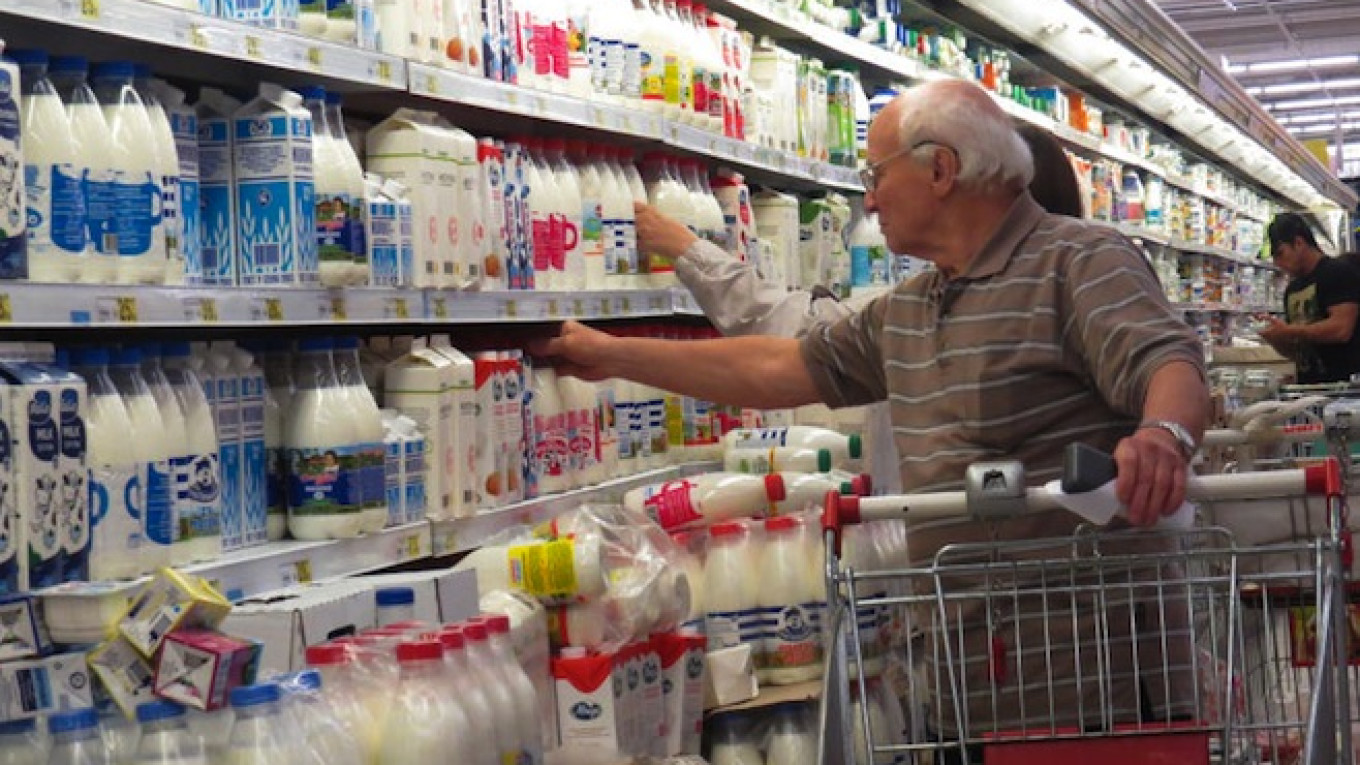As spoiled political relations between Russia and Ukraine spill over into trade policy, Russia's food safety watchdog slapped a blanket ban on all imports of dairy and dairy-containing products from Ukraine beginning Monday.
Russia's Federal Veterinary and? Phytosanitary Inspection Service cited a lack of proper quality control as grounds for the decision.
The products do not meet certification standards and “are dangerous, as they are produced with the use of palm oil of unknown quality and origin,” the agency's spokesman, Alexei Alexeyenko, told ITAR-Tass.
The ban will apply not only to milk and cheese, but to any products containing dairy, the watchdog's head Sergei Dankvert told Interfax on Friday.
Ukraine's Agrarian Policy and Food Minister Ihor Shvaika was quoted as saying Friday by Interfax that the ban was politically motivated and that no Ukrainian potatoes, dairy products, poultry or cattle had been found to contain banned substances. He also said his ministry was taking part in the preparation of sanctions against Russia, Prime news agency reported.
Russia's decision could herald further restrictions: Alexeyenko told RIA Novosti on Wednesday that Russia may completely halt food imports from Ukraine for as long as the country's negotiations on integration with the EU continue.
Both leading up to and following Ukraine's signing of a comprehensive free trade agreement with the European Union in June, Russia has threatened to reconsider the preferential trade regime currently in place between Russia and Ukraine.
The blanket ban on dairy products follows a series of smaller bans on imports from individual Ukrainian dairy factories over recent months.
Dairy products account for only a fraction of Ukraine's exports to Russia, but the ban signals that more extensive measures are well within the realm of possibility.
Further action could strike a harsh blow to the Ukrainian economy, which has already been pushed into recession by the crippling effects of months-long pro-EU protests in Kiev earlier this year, Russia's annexation of the Crimean peninsula in March and the simmering pro-Russia insurgency in the country's east.
Prime Minister Arseniy Yatsenyuk, who tendered his resignation on Thursday, recently said that Ukraine could lose $5 billion a year if Russia cuts off trade relations, which would shrink the Ukrainian economy by an additional 2 percentage points, Bloomberg reported.
Russia accounts for nearly a quarter of Ukraine's external trade, providing about 8 percent of the country's gross domestic product.
According to Nomura analysts, cheese represents 0.5 percent of Ukraine's total exports and is the country's 10th-largest export to Russia.
Material from Reuters is included in this report.
See also:
A Message from The Moscow Times:
Dear readers,
We are facing unprecedented challenges. Russia's Prosecutor General's Office has designated The Moscow Times as an "undesirable" organization, criminalizing our work and putting our staff at risk of prosecution. This follows our earlier unjust labeling as a "foreign agent."
These actions are direct attempts to silence independent journalism in Russia. The authorities claim our work "discredits the decisions of the Russian leadership." We see things differently: we strive to provide accurate, unbiased reporting on Russia.
We, the journalists of The Moscow Times, refuse to be silenced. But to continue our work, we need your help.
Your support, no matter how small, makes a world of difference. If you can, please support us monthly starting from just $2. It's quick to set up, and every contribution makes a significant impact.
By supporting The Moscow Times, you're defending open, independent journalism in the face of repression. Thank you for standing with us.
Remind me later.


